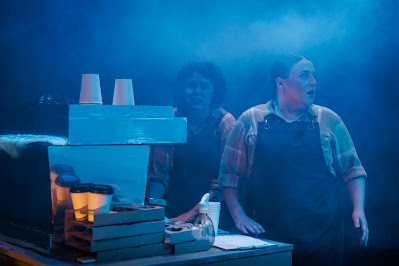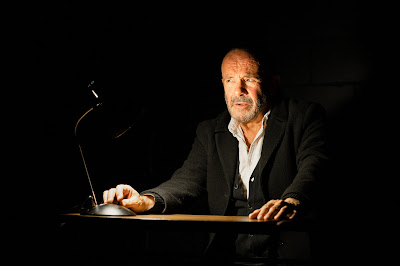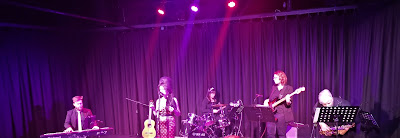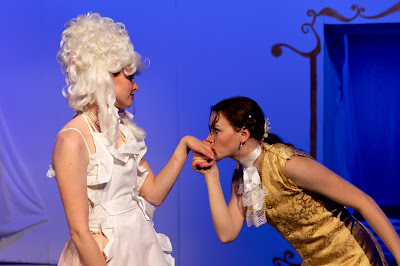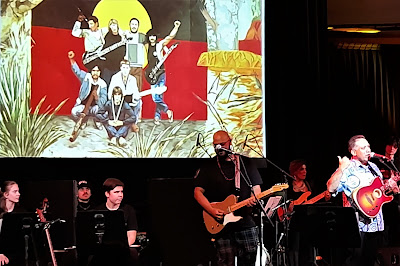WHAT: Facing Up
WHEN: 3-13 May 2023
WHERE: Theatre Works
WRITTEN & DIRECTED BY: Lynden Nicholls
DESIGNED BY: Adam (Gus) Powers
PERFORMED BY: Trudy Fatnowna Edgeley, Zerene Jaadwa, and Andre Prenc
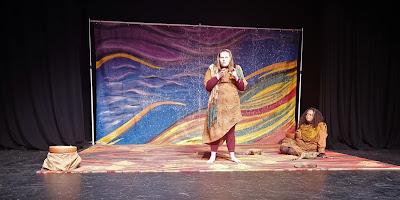 |
| Zerene Jaadwa and Trudy Fatnowna Edgeley |
Very occassionally a piece of theatre comes along which is greater than the sum of its parts and has a clarity of purpose and message brighter than the purest diamond. Facing Up, currently playing at Theatre Works, is a show of that calaber.
On the surface, Facing Up is a simple beast. Using the verbatim theatre technique, it simply follows the timeline of Australian Prime Minister-ship since Federation in 1901. From the first to the last each Prime Minister is given the chance to enunciate their Indigenous policy in their own words. Alongside, two First Nations women also speak in the words of their people to exhibit the practical experiences and outcomes for the people affected by those policies. Suffice to say it is not an honourable forward progress.
You might think it to be a tedious theatrical approach, sticking to a linear timeline, particularly as the endless stream of Prime Ministers rarely move from behind their podium to sit in the dirt (literally) with the people they are making decisions for. In this case, however, it is strangely compelling and whilst I didn't recognise the names of a lot of the early 20th century Prime Ministers, I kept hoping and praying the next one would do better, or perhaps the next one would do better, or perhaps the next one would do better... and so on. Rarely are we confronted with just how appalling our history in this matter actually is.
There are moments of hope, but they are rare and recent. I found myself wondering how we could go from Barton, our first Prime Minister, saying we will not pass laws for our Indigenous population, and in only a few short years to definitively work to curtail and confine those very people.
I have been despairing over the past decade over the lack of moral and ethical integrity of our politicians. Facing Up showed me this is an endemic disease which has infected our politics since Federation and probably since forever in human history. The horror, though, is that what our history in this matter has done is created a modern slave caste even though everyone is loathe to taint themselves with the truth of that word.
Facing Up is not dire or depressing though - a result which comes from the happy accident of our current Prime Minister, Albanese. The spark of hope which comes with Whitlam and which is quickly extinguished by Prime Ministers which followed, ignites a small flame with Rudd, and begins to blaze with the Uluru Statement from the Heart. It is a fire that even Morrison was not able to extinguish despite his appalling cuts to programs and funding for communities across Australia.
Facing Up is a play in which the ending changes with each Prime Minister. It was first performed when Turnbull was Prime Minister and our First Nation people decided to step forward and ask the rest of Australia to engage in Makarata to build our nation together. We then got stuck in the Morrison years which had the show ending in discomfort and despair.
Now, however, it is the time of the looming referendum and a chance for us all to face our history and do what needs to be done to heal and make Australia a place we can be proud of and love. This is a dream we have all aspired to but never achieved because we weren't hearing, seeing - we weren't listening, watching. It is hard to admit to shame, but it is impossible to move forward if you keep your skeletons in the closet - out of sight, out of mind.
I say there is power in seeing all the Prime Ministers but if this play continues to live as we evolve as a society there might need to be some editing. Whilst there is some interest is seeing every Prime Minister, they contribute nothing if they were only in office for 16 days or had no articulated policy in this matter. I suspect the play will be stronger if the 'no comment' Prime Ministers are omitted. They can be acknowledged in the program notes I feel. This would keep a sense of pace and a little bit of the unknown for the audience which will act to prevent redundancy and the loss of attention needed for the work.
The great power of Facing Up though, lies in the truth telling of Jaadwa and Edgeley. As a piece of verbatim theatre, the words they speak are not their own, but they are the words of a real person in a real place and time. The tears they cried when they spoke of The Intervention and their removal from the protection of the Anti-Discrimination laws became the tears I cried too.
Can you even begin to imagine your government actively removing your right to be treated with the same dignity and respect afforded to all other people in this country? A petition presented to government is ignored because a politician decides you are too dumb to understand what you have written - because of your race!!!! What would you do? How would you feel? I am crawling out of my skin in outrage as I write this review.
Having said all this, Facing Up is not a negative play. On the contrary, it is all about learning from the past and finding a way forward. It is about finding ways to work together and restore dignity to a vital part of our community. Our First People. This is ultimately embodied in the song of togetherness which ends the show and in which we all get to join in.
Some pieces of theatre transcend entertainment. They are essentially important to the spiritual wellness of everybody and everything. Facing Up is that kind of show. It is simple, it is honest, and it is aspirational. It is a show all Australians should have the opportunity to see. Especially with the important decision we all have to make looming so large.
4 Stars
